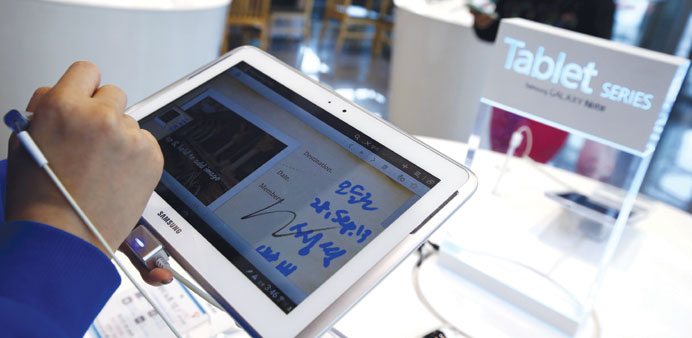An employee demonstrates the use of a Samsung’s Galaxy Note 10.1 tablet device at the company’s digital plaza store in the Gangnam district in Seoul. A data from the trade ministry showed yesterday South Korean exports grew by an annual 7.1% in December.
Reuters
South Korean exports grew by an annual 7.1% in December, beating forecasts and pointing to Asia’s fourth-largest economy sustaining momentum into the new year, though there are increasing concerns about the impact of a weak Japanese yen.
Several of South Korea’s big industries – automobiles, ships and steel – compete fiercely with Japanese rivals, and authorities are worried that the Korean won’s rise to a five-year high against the yen will hurt their competitiveness.
Shipments from South Korea, the world’s seventh-largest exporter, were $48.1bn last month, while imports grew an annual 3% to $44.4bn.
That led to a trade surplus of $3.7bn, data from the Trade, Industry and Energy Ministry showed yesterday.
Export growth was slightly stronger than the median forecast of 6.4% in a Reuters poll, and well above the 0.2% recorded in November.
The data is another sign of economic momentum that should be maintained into 2014. The Bank of Korea expects quarterly economic growth of at least 0.8% in the fourth quarter, in seasonally adjusted terms, following growth of 1.1% in the two prior quarters.
For the full year, exports grew 2.2% while imports shrank by 0.8%, resulting in a trade surplus of $44.2bn. The finance ministry expects exports to grow by 6.4% in 2014, benefiting from a gradual global recovery.
State-owned Export-Import Bank of Korea has said it expects exports in the first quarter to grow by around 10% from a year earlier because of better external conditions.
That would be double the growth of 4.8% in the final quarter of 2013, which was best growth in two years, Reuters calculations show.
Indeed, exports to the US rose by an annual 13.2% in December, while exports to China rose by 8.4%. Shipments to the European Union rose 2%.
However, Seoul is concerned about the impact on its exporters of the depreciation of the yen as Tokyo uses massive fiscal and monetary stimulus to try to escape deflation.
This week, bid rates for the yen fell to a five-low under 10 won, and it has weakened by nearly 30% against the South Korean currency over the past 15 months.
The deputy finance minister expressed concern about the yen’s rapid decline, and the trade ministry yesterday warned that the weak yen poses a threat to exports.
Policymakers have said they will consider countermeasures, though they have declined to elaborate. Currency dealers suspect authorities could buy dollars to indirectly keep the won from rising further against the yen.
Samsung Electronics Co. posted record third-quarter earnings on demand in emerging markets for its smartphones while Hyundai Motor Co.’s profit increased as car sales rose in China. Posing a risk for South Korean exporters is the possibility the won will continue to strengthen against the yen after rising 22.5% in 2013, putting the companies at a disadvantage to Japanese competitors.
Ships, mobile phones and automobiles will lead strong growth in overseas sales this year, the ministry said.
Currency volatility will be the biggest downside risk for the nation and its exports will see “significant” impact if the yen falls further, a Bank of Korea board member said at a December 12 rate meeting, according to minutes released on December 31.
South Korean policy makers should focus on strengthening the nation’s long-term growth base when there are clearer signs that the US and other advanced economies are recovering from the crisis, Bank of Korea Governor Kim Choong Soo said on December 31 in his New Year speech.
The BoK will keep its benchmark interest rate unchanged at 2.5% on January 9 as consumer inflation has stayed below its target range between 2.5% and 3.5% since May 2012, according to four economists

